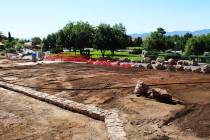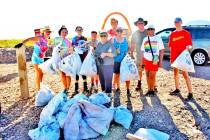Rangers encourage lake visitors to remain weather smart
Strong winds and freezing temperatures are forecast for Lake Mead National Recreation Area through Saturday; therefore, rangers are advising visitors and employees to be cautious of the hazards.
A National Weather Service wind advisory is in effect through midnight Wednesday. Tuesday, gusts reached 35 miles per hour. They are expected to increase to 40 to 50 miles per hour as a cold front moves through.
A hard freeze watch is in effect from 9 p.m. Wednesday through 9 a.m. Saturday. Subfreezing temperatures are forecast, with the coldest temperatures forecast for Wednesday and Thursday nights.
“Our park is known as a hot-spot destination with temperatures often surpassing the century mark. We’re encouraging visitors to be weather smart during these winterlike conditions, just as they are in the summer,” said Christie Vanover, Lake Mead NRA public affairs officer.
Strong winds are always a hazard on the lakes because they create waves that can capsize a boat. Recreation area maintenance staff observed 4- to 5-foot swells Tuesday morning. With lake temperatures around 62 degrees, Vanover said capsizing would be very dangerous because immersion hypothermia can occur within one hour.
Wearing a life jacket and a combination of fleece or wool along with synthetic clothing helps increase survival times in cold water, according to the Centers for Disease Control and Prevention. Dressing in layers also is important for other outdoor enthusiasts.
“Hikers and hunters should dress warmly when it’s cold, but they need to be able to remove layers if they become too hot, because sweat can also lead to hypothermia,” Vanover said.
Another ranger tip for recreating in cold temperatures is to monitor sunset times. The sun starts to set around 4 p.m. this time of year, and temperatures can drop 10 degrees in a couple of hours.
“Visitors can keep warm with campfires, but they should never use grills, camp stoves or lanterns inside a tent or camper because they can lead to carbon monoxide poisoning,” she said.
Campfires are permitted in developed areas in grills, fire rings and portable barbecues and stoves. They also are permitted throughout the backcountry.
“This is a very enjoyable time of year to recreate within our wilderness areas and backcountry,” Vanover said. “We’re just asking visitors to plan for changing weather. If they find themselves in an emergency situation or experiencing signs of cold stress, they should call 911 immediately.”
Additional cold weather tips can be found on the CDC website at http://emergency.cdc.gov/disasters/winter/guide.asp.











